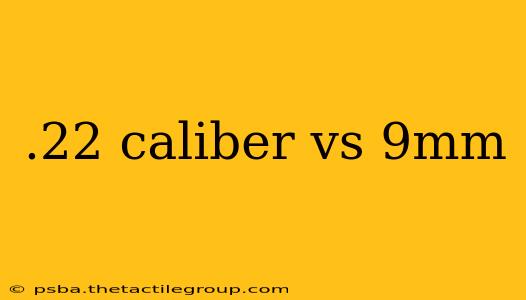Choosing the right caliber for your firearm is a crucial decision, influenced by factors like intended use, personal preference, and legal restrictions. This in-depth comparison explores the key differences between the popular .22 caliber and the 9mm, helping you make an informed choice.
Understanding Caliber: Size Matters
Before diving into the specifics, let's clarify what "caliber" means. It refers to the diameter of the projectile (bullet), typically measured in either inches (like .22) or millimeters (like 9mm). This seemingly small difference significantly impacts ballistic performance.
.22 Caliber: The Versatile Small-Bore
The .22 caliber, known for its affordability and relatively low recoil, is a favorite among target shooters, plinkers, and those seeking a smaller, more manageable firearm. Its versatility extends to various firearm types, including rifles, pistols, and even shotguns (.22 bore).
Advantages of .22 Caliber:
- Low Recoil: Ideal for beginners and those with sensitivity to recoil.
- Affordable Ammunition: Significantly cheaper than 9mm, allowing for more practice.
- Quiet Operation (with subsonic ammo): Subsonic .22 rounds produce less noise, making them suitable for hunting small game or practicing in noise-sensitive areas.
- Lightweight: Contributes to easier handling and maneuverability.
Disadvantages of .22 Caliber:
- Limited Stopping Power: Its smaller projectile size and lower energy levels result in less stopping power compared to 9mm, making it less effective for self-defense in many scenarios.
- Penetration Limitations: May not penetrate thicker materials or offer sufficient stopping power against larger targets.
- Accuracy Sensitivity: Can be more sensitive to variations in ammunition quality and firearm condition.
9mm: The Popular Choice for Self-Defense and Law Enforcement
The 9mm Parabellum (or 9x19mm) is a widely popular cartridge known for its balance of stopping power, manageable recoil, and widespread availability. Its popularity stems from its effectiveness in self-defense and its adoption by numerous law enforcement agencies globally.
Advantages of 9mm:
- Superior Stopping Power: Offers significantly more stopping power than .22 caliber, making it a more effective self-defense round.
- Greater Penetration: Can penetrate thicker materials and offer better protection against threats.
- Wide Availability and Affordability (relatively): While more expensive than .22, 9mm ammunition is readily available and relatively affordable.
- Diverse Ammunition Options: Offers a wide range of ammunition types, including hollow points, full metal jacket, and others, allowing customization for different applications.
Disadvantages of 9mm:
- Higher Recoil: The increased power results in more noticeable recoil compared to .22 caliber, potentially challenging for beginners or those sensitive to recoil.
- Higher Ammunition Cost: Significantly more expensive than .22 caliber ammunition.
- Greater Noise: Generally louder than .22 caliber, making it less suitable for quiet operations.
Choosing the Right Caliber: A Matter of Purpose
The "better" caliber ultimately depends on your needs and intended use.
- Target Shooting and Plinking: The .22 caliber's affordability and low recoil make it ideal for practice and recreational shooting.
- Self-Defense: The 9mm's superior stopping power and penetration are preferred for self-defense scenarios.
- Hunting Small Game: Both calibers can be used effectively, but .22 caliber is often preferred for quieter operation.
Before making a decision, consider factors like your experience level, physical capabilities, legal restrictions in your area, and the specific applications you intend to use your firearm for. Consulting with experienced firearm professionals can further assist you in making an informed choice. Remember always to prioritize safety and adhere to all local firearm laws and regulations.

